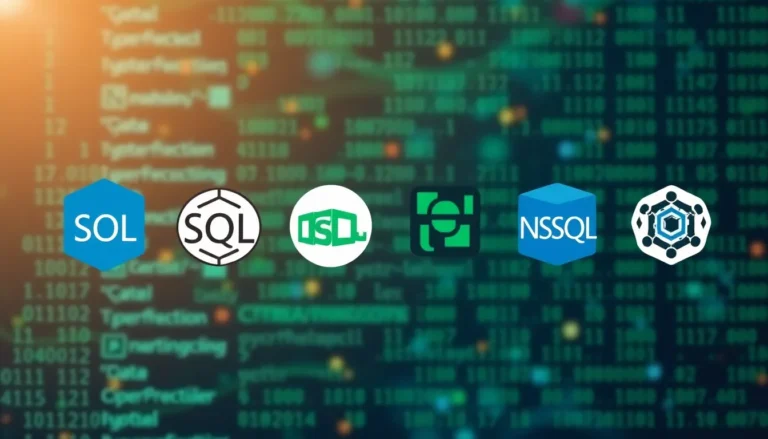In the world of programming, keywords are like secret agents—they hold the power to unlock the mysteries of code. Whether you’re a seasoned coder or just dipping your toes into the tech waters, understanding these keywords is essential. They’re the building blocks that help transform mere ideas into functional software.
Imagine trying to build a skyscraper without knowing what a foundation is. That’s what coding feels like without grasping those crucial keywords. If you’ve ever found yourself scratching your head over syntax or wondering why your code just won’t cooperate, you’re not alone. Thankfully, Quizlet has your back! It’s the ultimate tool for mastering programming language keywords, turning confusion into clarity with a sprinkle of fun. So grab your virtual magnifying glass and get ready to decode the language of the tech world.
Overview Of Programming Languages
Programming languages serve as tools for developers to communicate with computers. Various languages cater to specific tasks, ranging from web development to data analysis. Each language contains a unique set of keywords, which form the building blocks of code. Understanding these keywords empowers programmers to write effective and efficient code.
Languages like Python, Java, and C++ represent popular choices among developers. Each of these languages offers syntactic rules and reserved keywords that define their functionality. For instance, Python uses keywords such as def, if, and while to structure its commands, influencing how programs are executed. Java introduces keywords like public, class, and static, which establish its object-oriented programming principles.
Learning programming languages involves grasping their keywords and syntax. When developers comprehend these foundational elements, they navigate complex coding challenges with ease. Quizlet proves beneficial for mastering programming language keywords, offering interactive flashcards and quizzes to reinforce learning. This tool encourages effective memorization and quick recall, promoting a smoother coding experience.
Additionally, many resources, including online courses and coding boot camps, emphasize the significance of keywords. These courses often incorporate practical projects where learners apply their knowledge in real-world scenarios, solidifying their understanding. Engaging with communities, such as coding forums and study groups, enhances the learning journey through collaboration and discussion.
Programming languages play a vital role in software development. Grasping their keywords not only supports the logical structure of code but also equips programmers with the skills to solve problems effectively. Utilizing tools like Quizlet strengthens this knowledge, making programming more accessible and enjoyable.
Importance Of Keywords In Programming

Keywords play a pivotal role in programming languages, acting as fundamental elements that define code structure and functionality. Understanding these terms enhances a programmer’s ability to write effective software.
Role In Syntax
Keywords serve as building blocks for code syntax. Each programming language features unique keywords that govern how statements are structured. Without proper usage of these keywords, code becomes ambiguous and may lead to errors. For example, terms like “if,” “else,” and “while” establish control flow in languages such as Python and Java. Grasping these keywords allows developers to maintain clarity and precision, enabling both novices and professionals to express complex logic clearly. Correct syntax reduces debugging time, streamlining the software development process.
Role In Functionality
Keywords enhance programming functionality by determining how commands operate within a language. They dictate the language’s behavior, enabling specific actions or data manipulations. In C++, keywords like “class” and “public” define object-oriented structures, while Python keywords like “def” establish function definitions. Each keyword brings distinct features to programming, thus enabling efficient code execution. Learning these terms contributes to a deeper understanding of the language and fosters skill development in practical applications. Mastery of keywords ultimately leads to more robust, flexible, and maintainable programming solutions.
Popular Programming Languages And Their Keywords
Understanding the keywords in popular programming languages is vital for effective coding. Each language features unique keywords that define its syntax and functionality.
Java
Java’s keywords include “class,” “public,” and “static.” These terms establish the structure of Java programs and dictate the visibility of classes and methods. The “if” and “else” keywords enable control flow, allowing developers to implement decision-making logic. Additionally, keywords such as “new” create objects, while “void” specifies method return types. Mastering these keywords equips programmers with the ability to design robust Java applications.
Python
In Python, keywords such as “def,” “import,” and “for” play essential roles in defining functions and importing libraries. The “if” statement allows conditional execution, while “elif” and “else” provide alternatives. Python engineers utilize “class” to create user-defined data types. Moreover, the keyword “in” is crucial for iterating over collections. Knowledge of these keywords enhances a programmer’s capability to write clear and concise Python code.
JavaScript
JavaScript boasts keywords like “function,” “let,” and “const.” These terms define functions and variables, allowing developers to create dynamic web applications. Control flow keywords, including “if,” “else,” and “switch,” dictate logic paths for code execution. The keyword “return” indicates return statements, while “async” facilitates asynchronous programming. Familiarity with these keywords allows for the development of interactive web experiences.
C++
C++ features keywords such as “class,” “private,” and “public.” These terms define object-oriented programming constructs and their access levels. Control keywords like “if,” “switch,” and “for” enable developers to manage program flow effectively. Memory management relies on keywords such as “new” for dynamic allocation and “delete” for deallocation. Understanding these keywords fosters the creation of efficient and maintainable C++ applications.
Features Of Quizlet For Learning Keywords
Quizlet provides a range of features tailored for mastering programming keywords. Interactive flashcards enhance memorization, allowing users to practice keyword definitions and application. Students can create custom study sets, incorporating specific keywords relevant to their programming languages like Python and Java.
Multiplayer games, such as Quizlet Live, facilitate collaborative learning. Groups engage in real-time competition, reinforcing keyword knowledge through dynamic interactions. This format encourages discussion and deeper understanding, transforming keyword memorization into a social experience.
Visual aids play a crucial role in Quizlet’s design. Users benefit from diagrams and images that accompany keywords, offering contextual meaning that supports comprehension. With a variety of study modes, including practice tests, learners can assess their progress and identify areas for improvement.
Timed learning activities boost engagement and encourage quick recall of keywords. Quizzes can focus on multiple-choice questions, fill-in-the-blank exercises, and written responses, promoting diverse retention strategies. By setting personal goals, learners can track their keyword mastery over time.
Mobile accessibility ensures that Quizlet is available anytime, anywhere. This flexibility allows users to reinforce their understanding of programming keywords during commutes or breaks. Offline study options enable uninterrupted learning, making it easier to integrate study habits into busy schedules.
Lastly, the integration of audio pronunciation supports auditory learners. Hearing keywords pronounced correctly enhances retention and aids in proper usage within code. Overall, Quizlet’s diverse features foster an enjoyable and effective environment for learning crucial programming keywords.
Mastering programming keywords is vital for anyone looking to excel in coding. These keywords not only structure code but also enhance its functionality. By utilizing tools like Quizlet, learners can effectively grasp and retain these essential terms.
The interactive features and customizable study options make Quizlet a valuable resource for both beginners and seasoned programmers. Engaging with the material through games and flashcards fosters a deeper understanding of programming languages. Ultimately, a solid grasp of keywords lays the groundwork for efficient coding and problem-solving skills, making the journey into programming both rewarding and enjoyable.






